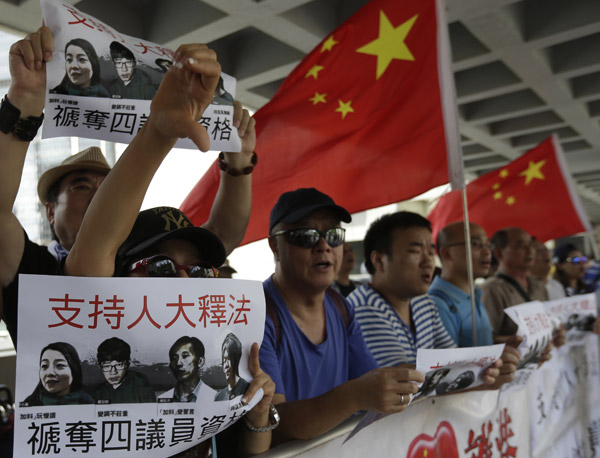 Residents outside the high court hold placards and shout slogans on Friday to support the disqualification of four lawmakers who did not follow the requirements when they took their oaths to serve on the Legislative Council in October last year. (Photo by ROY LIU/CHINA DAILY) Hong Kong's High Court has thrown out four lawmakers of the Legislative Council for violating the legal requirements of oath-taking when being sworn in. They are the second group of legislators to be disqualified for not taking the oath properly, after two separatist lawmakers were ousted in November. In a written judgment handed down on Friday, Court of First Instance Judge Thomas Au Hing-cheung said the oaths by the four lawmakers-Leung Kwok-hung, Edward Yiu Chung-yim, Lau Siu-lai and Nathan Law Kwun-chung-didn't follow the strict wording and solemnity as required by law. Therefore, the court ordered the four to be disqualified with immediate effect. Their Legislative Council membership was deemed invalid from Oct 12, 2016. The four lawmakers were found to have deviated from the statutory wording of the oath, which amounted to an unlawful swearing-in, according to the National People's Congress Standing Committee's interpretation of the Basic Law, the city's constitutional document. The court was told that during the solemn swearing-in, Leung was chanting political slogans and Yiu added words to his oath. Lau read her oath with a six-second interval between each Chinese character deliberately, as she admitted, to profane the oath. Law changed his tone when pledging allegiance to China to make it sound like a question. The judicial review to challenge the eligibility of the four was moved by Leung Chun-ying, the former chief executive of the Hong Kong Special Administrative Region, and Secretary for Justice Rimsky Yuen Kwok-keung in December. In November, two lawmakers were disqualified after they advocated independence and insulted the nation during their swearing-in in October. Outside the courtroom on Friday, a group of Hong Kong people applauded the court's decision. Chief Executive Carrie Lam Cheng Yuet-ngor said she respects the judgment. She said the basis of a healthy executive-legislative relation is the rule of law. Legislative Council President Andrew Leung Kwan-yuen said the council's Secretariat will send a letter to each of the disqualified lawmakers to inform them to move out of their offices in two weeks. The Legislative Council Commission will discuss later how much salary and remuneration the lawmakers should pay back. He said previous Legislative Council voting results will not be affected. The disqualification of the four lawmakers will also temporarily give the pro-establishment camp an upper hand in Hong Kong's legislature. That means that before a by-election, the opposition won't have enough seats to veto motions or bills proposed by the government, even if they vote en bloc. It may help the pro-establishment camp to put an end to the long-standing stalling tactic, known as filibustering, that is frequently used by the "pan-democratic" camp. The Legislative Council will have its summer recess from the end of July to early October. A by-election is expected in several months. The city's legal professionals supported the court's decision. Barrister and legislator Priscilla Leung Mei-fun said the judgment "gave back the dignity" to the Legislative Council and clarified the requirement laid down in the "one country, two systems" principle and the Basic Law.
|
Powered by Discuz! X3.4
© 2001-2013 Comsenz Inc.